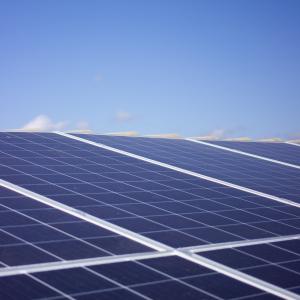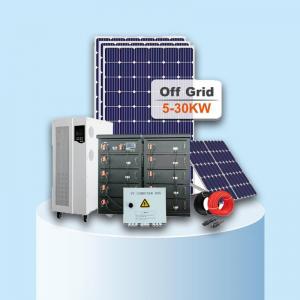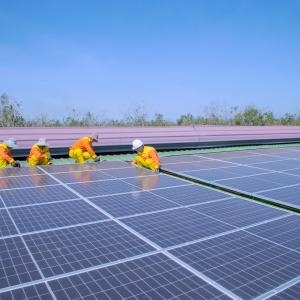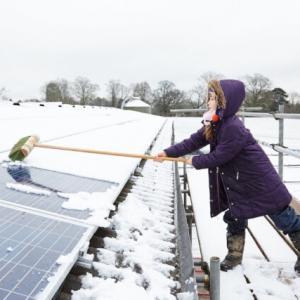Three Types of Solar Power System
As the demand and prices of electricity have kept on rising, people start to look at renewable energy sources for its power needs. In recent years, solar energy has become a popular renewable energy source because of its falling costs and improving efficiency.Solar power is the utilization of solar energy by different technologies by capturing the heat radiated from the sun. A solar power system is a setup that generates electricity by utilizing the solar energy. A typical solar system consists of solar panels (which absorb sunlight), inverter (which converts DC into AC), batteries (to store the extra generated power), grid box and balance of systems (wires, nuts etc.). A solar system comes in various sizes like 1kW, 3kW, 5kW, 10kW etc.
Generally, the solar power systems can be divided into three types.
Grid-tied Solar Power System

This type of solar power system is the most common one. A grid-tied or grid-connected solar power system, as the name suggests is a solar power system that is connected to the home & to the traditional electricity utility grid. This type of solar power system does not include any storage battery.
The solar power generated by the solar panels is instantaneously consumed by all the appliances. In case the solar power system is generating more power than the home is consuming, the excess power can be sold back to the utility company under a scheme known as net-metering. When the solar power system is not producing sufficient power, the balance power required by the appliances is drawn from the utility grid.
This type of system requires a few panels, wiring boxes and disconnects and an inverter. Also, you have to make an interconnection agreement with the local utility company.
Advantages
1. Initial cost: Purchasing a solar power system for your home can be very expensive. But grid-tied systems are much cheaper since they use less equipment than the other types of rooftop solar power.
2. Low maintenance: The operating cost of grid-tied systems is very low. Solar panels have 20 to 25 years of warranty.
3. Reliability: Grid-tied system is simple and have no downtime (without electricity).
4. Flexibility: You have the chance to design your system with an alternative energy source and a utility source. In this way you can change the system to meet your needs in the future.
Disadvantages
The setback of this type of solar power system is that when the sun goes down, you are not able to use any of the energy that the solar panels produce. This can also happen if your electric grid is down; your solar panels will be shut off automatically too, leaving you without energy. This will definitely influence your daily life.
Off-grid Solar Power System

Off-grid solar power systems are ideal for remote rural areas or applications where other power sources are either unavailable or impractical. Off-grid solar power systems can either be AC-based systems, in which case they include an inverter that converts the energy stored in batteries to AC power & feeds it to AC appliances, or, DC-based systems, that are cheaper as they don’t need an inverter but the power can only be fed to DC appliances.
This type of system is more expensive because it is bigger since it’s not connected to the electric grid. This requires more solar panels and batteries.
Advantages
1. Independence: One of the best things about this type of solar power system is that you don’t depend on the utility company. You are not subject to the terms and policies of the utility company.
2. No blackouts: Another benefit is that when everyone else has no electricity, your home will still have full power. This is very important to people with health conditions that require electronic devices or refrigerated medicines.
3. No electricity bills: Because you are producing your own electricity you will never again have to pay a bill to the utility company.
Disadvantages
1. Higher initial cost: If you don’t have a connection from the utility company, you will need a backup battery when there is no sun. Adding this source of backup will increase your costs.
2. Limited solar energy storage: If the weather is cloudy or rainy for a few days, you may run out of stored electricity.
3. Energy efficiency is a must: You need to be very careful about your energy, or you may not have enough power for your home.
Hybrid Solar Power System

A hybrid solar power system is a solar power system with energy storage that is similar to a grid-tied solar power system but comes with an energy storage system usually in the form of battery backup. In the last couple of years, this type of solar power system is becoming very popular, even though it’s more expensive. When solar energy production exceeds demand, the excess solar power is utilized to charge batteries & stored for later use. When production is lesser than demand, the stored energy from the batteries is used to make up the shortfall.
A well designed hybrid solar power system provides you dual benefits of reducing your electricity bills while also providing you the comfort of having back-up power during a power outage. The hybrid system consists of a PV array, a charge controller, a battery bank and inverter and in some occasions a tertiary power source like a wind turbine or a gas generator.
Advantages
1. Energy storage system: If your solar power system produces excess energy, it can be stored in the battery. So even if there is no sunlight, you can still power your home. If there is a power outage, your home will still have power for hours.
2. Save money: The battery can provide additional opportunities to save money because your energy storage system can make sure you are using its power instead of the power of the grid.
Disadvantages
1. Cost: The system costs more because you need to change the batteries regularly. Although the cost of batteries has gone down in recent years, they still need to be replaced at some point.
2. High-level expertise: This solar power system is more complex so you may require a solar installer with a higher level of expertise to design and install. So make sure you find out from your solar power company if they install this type of system.






